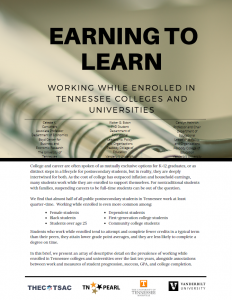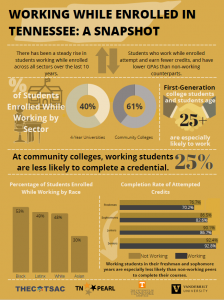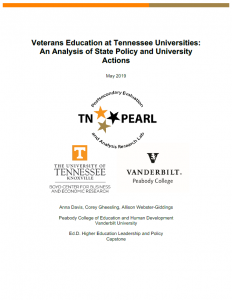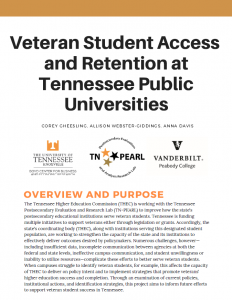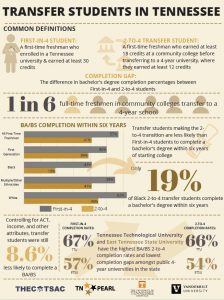Coming Soon
1. Adela Soliz and Hidahis Mesa. (accepted). Improving community college to university transfer. Education Finance and Policy
Current Publications
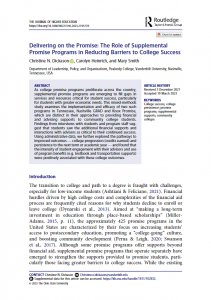
Authors: Christine N. Dickason, Vanderbilt University; Carolyn Heinrich, Vanderbilt University; and Mary Smith, Vanderbilt University
Published: April 25, 2023
Excerpt: As college promise programs proliferate across the country, supplemental promise programs are emerging to fill gaps in services and resources critical for student success, particularly for students with greater economic needs. This mixed-methods study examines the implementation and efficacy of two such programs in Tennessee, Nashville GRAD and Knox Promise, which are distinct in their approaches to providing financial and advising supports to community college students. Findings from interviews with students and program staff suggest that students saw the additional financial supports and interactions with advisers as critical to their continued success. Using administrative data, we further explored the pathways to improved outcomes — college progression (credits earned) and persistence to the next term or academic year — and found that the intensity of student engagement with their advisors and use of program benefits (e.g. textbook and transportation supports) were positively associated with these college outcomes.

Authors: Cara DeLoach, Vanderbilt University; Adela Soliz, Vanderbilt University; and Hidahis Mesa, Vanderbilt University.
Published: Jan. 12, 2023
Excerpt: This article analyzes the implementation of two state grant programs in Tennessee aimed at improving the quality of in-demand postsecondary career and technical education (CTE) programming at community and technical colleges. We use insights from our findings to propose a conceptual framework for understanding how external funding can reduce institutional capacity constraints in similar contexts.

Authors: Cara DeLoach, Vanderbilt University; Adela Soliz, Vanderbilt University; and Hidahis Mesa, Vanderbilt University.
Published: Jan. 27, 2023
Excerpt: Federal and state policies increasingly call upon community and technical colleges to collaborate with industry and other outside stakeholders in order to improve career and technical education programs. We apply a framework from the public administration literature to understand how these collaborations are built. Using data from in-depth interviews with 49 participants engaged in building collaborations to improve workforce education and training across Tennessee, we find that productive networks rely on dynamic individuals that act as boundary spanners, facilitating communication across sectors. In addition, successful collaborations make use of meetings involving multiple interest groups to bridge, rather than reinforce, boundaries between stakeholders.
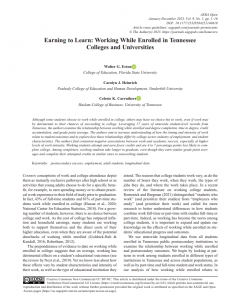
Authors: Celeste Carruthers, University of Tennessee; Walter Ecton, Florida State University; Carolyn Heinrich, Vanderbilt University
Published: Jan. 7, 2023
Excerpt: Although some students choose to work while enrolled in college, others may have no choice but to work, even if work may be detrimental to their chances of succeeding in college. Leveraging 17 years of statewide student-level records from Tennessee, the authors examine the relationship between working while enrolled and degree completion, time to degree, credit accumulation, and grade point average. The authors aim to increase understanding of how the timing and intensity of work relate to student outcomes and to explore how these relationships differ by college sector, industry of employment, and student characteristics. The authors find consistent negative associations between work and academic success, especially at higher levels of work intensity. Working students attempt and earn fewer credits and are 4 to 7 percentage points less likely to complete college. Among completers, working students take longer to graduate, even though they earn similar grade point averages and complete their attempted credits at similar rates to nonworking students.
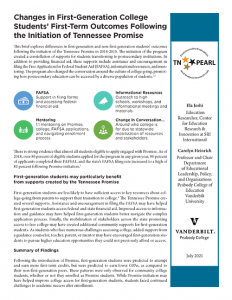
Authors: Ela Joshi and Carolyn Heinrich, Vanderbilt University
Published: July 14, 2021
Excerpt: This brief explores differences in first-generation and non-first-generation students’ outcomes following the initiation of the Tennessee Promise in 2014-2015. As students who face numerous challenges accessing college, added support from a guidance counselor, teacher, parent, or mentor may have encouraged first-generation students to pursue higher education opportunities they could not previously afford or access. The supports afforded by Promise may translate into improved academic outcomes for students, especially those from first-generation backgrounds. Following the introduction of Promise, first-generation students were predicted to attempt and earn more first-term credits, but were predicted to earn lower GPAs, as compared to their non-first-generation peers. These patterns were only observed for community college students, whether or not they enrolled as Promise students. While Promise-initiation may have helped improve college access for first-generation students, students faced continued challenges to academic success after enrollment.
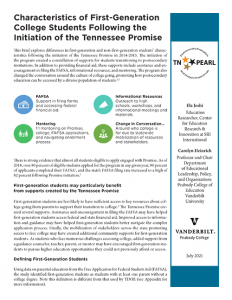
Authors: Ela Joshi and Carolyn Heinrich, Vanderbilt University
Published: July 14, 2021
Excerpt: This brief explores differences in first-generation and non-first-generation students’ characteristics following the initiation of the Tennessee Promise in 2014-2015. As students who face numerous challenges accessing college, added support from a guidance counselor, teacher, parent, or mentor may have encouraged first-generation students to pursue higher education opportunities they could not previously afford or access. Results from the analysis show that, following the initiation of Tennessee Promise, first-generation students were more likely to be female, Black, and Hispanic, and had lower ACT scores while non-first-generation students were more likely to be White or Hispanic. These descriptive findings suggest that the initiation of Promise may have helped improve college access for less advantaged students.

Authors: Ela Joshi and Carolyn Heinrich, Vanderbilt University
Published: July 14, 2021
Excerpt: This brief explores differences in first-generation and non-first-generation students’ first-term college outcomes. The brief also examines how differences vary depending on the number of degree-holding parents a student has as well as how first-generation students are defined. First-generation students attempted and earned fewer credits in their first term compared to their non-first-generation peers after accounting for student demographic, academic, financial, and institutional characteristics. First-generation students with one degree-holding parent performed slightly better than first-generation students with no degree-holding parents. While the magnitude of differences was small, differences were significant.
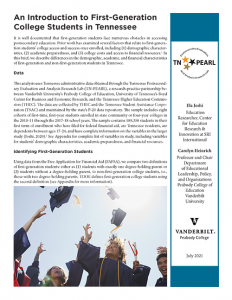
Authors: Ela Joshi and Carolyn Heinrich, Vanderbilt University
Published: July 14, 2021
Excerpt: In this brief, we describe differences in the demographic, academic, and financial characteristics of first-generation and non-first-generation students in Tennessee. We also compare differences for first-generation students with no degree-holding parents and those with one degree-holding parent. Our findings are consistent with prior work on first-generation students. Gaps are largest between first-generation students who have no degree-holding parents and students with two degree-holding parents. Students with one degree-holding parent appear to have similar ACT scores as their peers with two degree-holding parents, but fewer family financial resources.

Authors: Ela Joshi and Carolyn Heinrich, Vanderbilt University
Published: March 16, 2021
Excerpt: First-generation college students often lack informational and financial resources related to college and may particularly benefit from the supports created by the Tennessee Promise. The initiation of the Tennessee Promise in 2014 – 2015 created a constellation of supports for students transitioning to postsecondary institutions.

Authors: Celeste K. Carruthers, Ph.D., Jilleah G. Welch, Ph.D.
Published: June 30, 2020
Excerpt: “State and federal agencies invested $51.5 billion in grant aid for college students in 2016-17, and we know from decades of research that financial aid systems can help traditional students access or complete college. We know much less about how aid interacts with non-traditional students, however, and ours is the first study we know of to examine the take-up and effects of financial aid for students attending non-degree technical colleges.”
